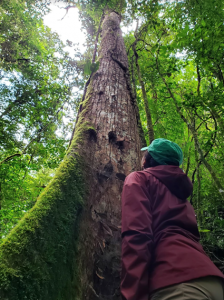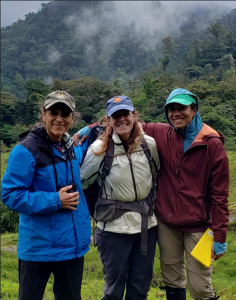Dr. Lowman Travels to Costa Rica in Support of her NSF Award
Tropical Montane Cloud Forests (TMCFs), which are unique tropical ecosystems that occur in a narrow altitudinal band between 800 and 3500 meters on mountains, are important ecosystems to study and conserve due to their exceedingly high biodiversity as well as the critical roles they play in local and regional water cycling. What makes these forests unique is that most of the trees in these regions are covered by epiphytes, plants that live on the surfaces of other plants and cover nearly all tree surfaces in the TMCF and contribute substantially to ecosystem function due to their high capacity to capture and temporarily store water. Unfortunately, these plants are the most vulnerable to changes in climate. A loss of epiphytes in the TMCF would lead to substantial biodiversity loss as well as a destabilization of water resources for human populations. “Under future climate change scenarios, TMCFs could see decreases in the frequency of cloudy and foggy conditions which could lead to large losses in epiphyte populations” says Dr. Lauren Lowman, Assistant Professor of the Department of Engineering here at Wake.
Dr. Lowman is the Principal Investigator of a recently funded Collaborative Research Award from the National Science Foundation (NSF) studying how climate change led to system shifts on tropical mountains and their role in epiphyte losses on host tree function, microclimate, and hydrology. Dr. Lowman and her co-investigators (Dr. Sybil Gotch at Franklin & Marshall College, Dr. Todd Dawson at UC Berkeley, and Dr. Nalini Nadkarni at the University of Utah) will investigate how will a loss of the diverse and abundant epiphyte communities in the TMCF impact tree health, energy balance and hydrologic function. The NSF-funded research team will monitor and record critical parameters surrounding the epiphyte at five locations within the Monteverde Region of Central Costa Rica. The collected data will help to develop a computer model of epiphyte-host tree water relations that coupled with a land-surface hydrology model will help to predict the effect of epiphyte loss on local and regional water cycling. As Dr. Lowman states “Simulating how epiphyte loss will affect the hydrologic cycle in TMCFs will be better prepare us to protect these valuable ecosystems in a changing climate.”

Dr. Lowman inspecting a tree at El Tigre Waterfalls.

Dr. Nalini Nadkarni, Dr. Sybil Gotsch, and Dr. Lowman search for potential study sites in Costa Rican TMCFs.
